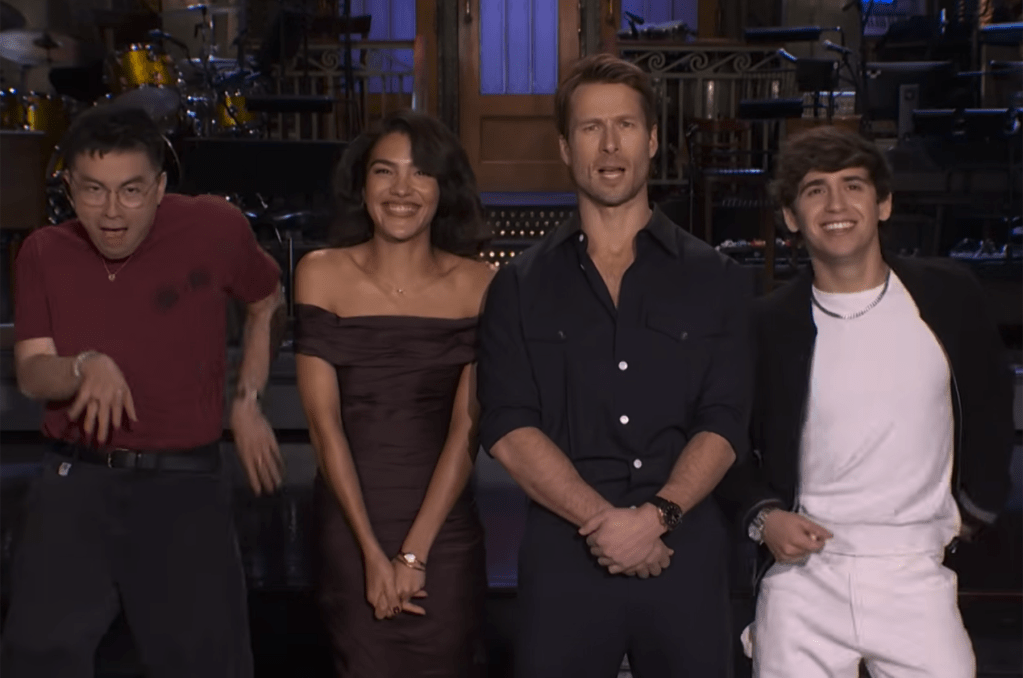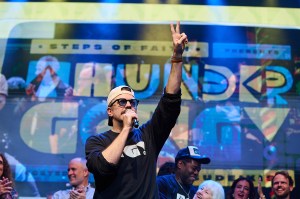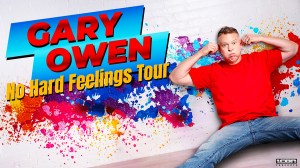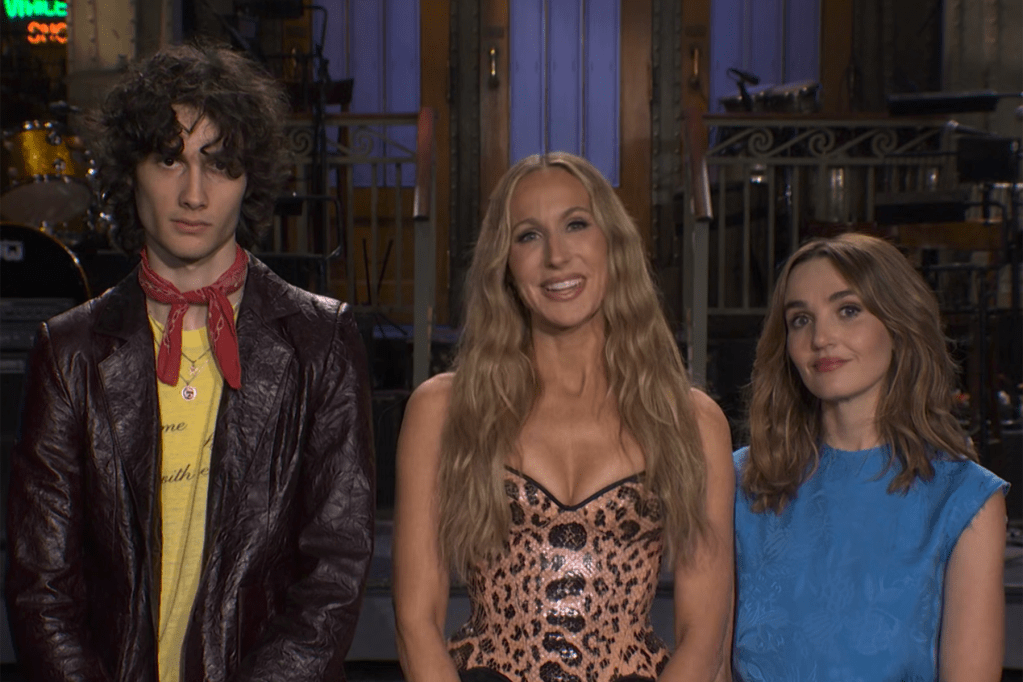Comedy news

Trending on Billboard
While ugly Christmas sweaters have become an annual holiday tradition, they’re not in the dress code for every festive event.
Jimmy Fallon finds that out the hard way in his latest Christmas song, the twangy “Ugly Sweater,” featuring Nashville newcomer Carter Faith. The song and video will debut on the Thanksgiving episode (Nov. 27) of The Tonight Show Starring Jimmy Fallon, but Billboard has the first sneak peek for you right now.
It all starts out as a classy affair in the clip, with Faith in a gorgeous off-the-shoulder red cocktail dress and an Aperol spritz in her hand, surrounded by similarly formal friends. “But I found out when you opened the door,” she sings — just as Fallon makes his entrance in a goofy red-and-green-striped sweater covered in scattered appliqués of a giant treble clef, Santa and his reindeer, and the words “FA LA.”
“I was the only one in an ugly sweater,” Fallon sings in a deep twang as he awkwardly makes his way through the party. “Red in the face, it don’t get better/ Pretty clear I’m no trend-setter/ I’m the only one in an ugly sweater.”
The song was written by Fallon and produced by Dave Cobb, and will be released by Republic Records. Watch the preview below:
Fallon is no stranger to holiday music, bringing cheer to Billboard’s charts over the years with seasonal tunes and albums, including his debut Christmas album Holiday Seasoning. Released in 2024, the set spent eight weeks at No. 1 on Billboard’s Comedy Albums chart and jingled to a No. 2 peak on Top Holiday Albums.
Fallon has also gifted Billboard’s lists with holiday jams like 2021’s “It Was a (Masked Christmas)” (with Ariana Grande and Megan Thee Stallion, a No. 38-peaking hit on Pop Airplay); 2022’s “Almost Too Early for Christmas” (with Dolly Parton, No. 30 on Adult Contemporary); 2023’s “Wrap Me Up” (with Meghan Trainor, No. 2 on Adult Contemporary and a top 40-charted hit on Pop Airplay and Adult Pop Airplay); and 2024’s “Holiday” (with Jonas Brothers, No. 1 on Adult Contemporary) — Fallon’s first No. 1 on a radio airplay chart and a top 40 hit on Adult Pop Airplay.
Faith was Billboard‘s Country Rookie of the Month in March, when she signed a music publishing deal with Universal Music Publishing Group Nashville. She released her debut album, Cherry Valley, via MCA Nashville in October.
You can watch the full premiere of “Ugly Sweater” on The Tonight Show Starring Jimmy Fallon on Thursday night (Nov. 27) at 11:35 p.m. ET on NBC and streaming on Peacock. It’s a very musical episode, as the night’s guests also include Ed Sheeran, Brad Paisley and Joe Keery (aka Djo).
Jimmy Fallon on The Tonight Show Starring Jimmy Fallon, Thursday, November 27, 2025.
Todd Owyoung/NBC
Trending on Billboard
Seven-time Super Bowl champion, entrepreneur and philanthropist Tom Brady and comedian and actor Druski have teamed with instant commerce platform Gopuff to support The Super Monday Off Coalition, a 501(c)(4) nonprofit organization lobbying to make the Monday after the Big Game a federal holiday.
Explore
See latest videos, charts and news
“Going into work the day after the big game? Hard pass,” said Brady in an announcement of the partnership with Gopuff and the coalition. “A massive number of employees unexpectedly call out of work the day after the Big Game, creating a huge headache for businesses across the country and a drag on our economy. That’s why I’m deepening my partnership with Gopuff to tackle this problem head-on.”
As part of the campaign launch, Brady and Druski — who, along with Kevin Hart and Kai Cenat, is producing and starring in a movie called Livestream from Hell — will serve as celebrity spokesman for the initiative, which sounds like the kind of cause the Trump administration could get behind. The duo will appear in a humorous television ad, titled “Hard Pass,” that will premiere during the Green Bay Packers vs. Detroit Lions Thanksgiving Day game, which will air on the Fox network.
The campaign will continue through television media buys and IRL activations throughout the remainder of the football season in an attempt to rally fans to suppor — and help fund — the coalition.
“The Super Bowl brings every single American together,” Yakir Gola, co-founder and co-CEO of Gopuff in the announcement. “That’s why the Monday after the Super Bowl must become Super Monday – an official federal holiday that honors our love for competition, victory, and the greatest country on Earth. By supporting The Super Monday Off Coalition, we’re putting real action behind a cultural truth.”
The announcement cites the 2025 results of a longstanding Harris Poll which indicate that 43% of employed Americans believe the Monday after the Big Game should be a national holiday — up from 37% in 2024 — and estimated that 22.6 million employed Americans planned to miss work the day after last February’s Super Bowl LIX between the Kansas City Chiefs and Philadelphia Eagles.
In 2018, HR consulting firm Challenger, Gray and Christmas estimated that the impact on American businesses is approximately $3 billion in lost economic activity. The Super Monday Off announcement claims that “planned, national holiday replaces disruption with predictability, giving employers, employees, and families the ability to plan ahead.”
To help support the cause, Gopuff will donate 1% of profits to the coalition — not to exceed $25,000 a week — from a collection game-friendly Super Monday Off collection of drinks and snacks through Feb 8, 2026 (the date of next year’s Super Bowl). Customers will also have the ability to donate to the nonprofit via their cart.
To learn more about The Super Monday Off Coalition 501(c)(4) and how you can support the effort, visit SuperMondayOff.com.
Trending on Billboard
Comedian, author, and podcast host Matt McCusker, who may have the most fascinating website homepage ever, will embark on his first-ever 18-city (so far) North American theater tour, which kicks off on Jan. 16 in Houston — a long way from his Haverton, Penn. upbringing.
Explore
See latest videos, charts and news
McCusker describes himself as a “stern, yet loving father and a sexually-dedicated husband who places God above all things, adding, “After spending much of my young life engaging in mostly non-violent criminal activity, I’ve dedicated the rest of my days to the pursuit of peace and harmony.”
Unless McCusker is pulling an Andy Kaufman, there’s no tongue-in-cheek stuff here. The “Thoughts” section of his website cites Victor Frankl. The psychiatrist and philosopher who developed logotherapy, which proposes that the search for meaning is man’s primary motivation.
The Healing Frequency Tour follows his successful Netflix special, A Humble Offering, which premiered in October and reached No. 8 on the platform’s series chart. His first special, 2023’s The Speed of Light, amassed nearly 4 million views on YouTube. He also co-hosts Matt and Shane’s Secret Podcast with Shane Gillis, which is the No. 1 Patreon podcast globally, boasting more than 5.5 million monthly downloads and a consistent Top 15 spot on Spotify’s comedy charts. Musical artists who have appeared include Skrilla, Action Bronson and the R&B group Dru Hill.
“I’m very pumped about this tour,” McCusker said in an announcement. “It’s bound to be fun and exciting for everyone involved.”
McCusker, who grew up about an hour from Gillis’ Mechanicsburg, PA hometown, is tight with the Tires co-creator. (Go Birds.) When Gillis hosted ESPN’s ESPY awards in July, he told the crowd, “Four-time WNBA all-star Brittany Hicks is here. Give it up for Brittany.” The cameras zeroed in on McCusker’s wife, Brittany, who is a police officer and a podcast host. “I knew none of you knew WNBA players. That’s crazy you [clapped for] it.”
Artist pre-sale tickets go on sale Tuesday, Nov. 18 at 11 a.m. ET. Local pre-sale begins Nov. 19 at 10 a.m. local, and general on-sale begins Friday, Nov. 21 at 10 a.m. local. More information can be found here.
Beyond stand-up, McCusker continues to expand his creative reach. He recently launched a series of animated shorts, including the The Papa John Paradox and is currently developing a follow-up to his book, Overlook: A Story About Drugs, Disappointment, and the American Dream.
Trending on Billboard
Fresh off the heels of her third one-hour Netflix special, Upper Classy, actress and comedian Cristela Alonzo will embark on her multi-city Midlife Mixtape Tour beginning next January.
The North American tour showcase kicks off Thursday, Jan. 15 at Quezada’s Comedy Club in Santa Ana Pueblo, New Mexico, with additional stops in Chicago; San Diego; Houston; Scottsdale, Arizona; Spokane, Washington; and San Antonio, Texas before wrapping up in Las Vegas at the Westgate Resort on May 2.
Tickets will go on sale starting Friday at 10 a.m. local time. More information can be found at CristelaAlonzo.com
The tour will also land at the Moontower Comedy Festival in Austin, Texas, on April 9 and 10. Tickets for the festival, which are already on sale, can be found here.
A first-generation Mexican-American, Alonzo grew up in poverty in San Juan, Texas, learned English from watching TV, and in 2014 adapted her story into the ABC comedy Cristela, becoming the first Latina to create, produce and star in her own network sitcom.
Her latest Netflix special Upper Classy, which debuted in late September, recently landed in the streamer’s top 10 most-viewed programs, following her acclaimed hours Middle Classy and Lower Classy.
In October, Billboard contributor Joe Levy wrote of Upper Classy, “To say that Alonzo is in the tradition of observational comics who mine their life experience for comedy is to underestimate both her mastery of that tradition, as well as its impact on her.”
Alonzo also voices Cruz Ramirez in Pixar’s Cars 3 and appears in the Hulu series This Fool. In 2019, she published Music to My Years: A Mixtape Memoir of Growing Up and Standing Up.
Cristela Alonzo: Upper Classy. Cristela Alonzo at the Majestic Theatre in Dallas, Texas.
Lauren Smith/Netflix
Trending on Billboard
Gary Owen — the Navy veteran, stand-up comedian and actor — will graduate from sold-out club dates to theaters on his 37-date No Hard Feelings North American Tour in 2026.
Explore
See latest videos, charts and news
Current plans will see Owen open his in Reading, Penn. on Jan. 16 and conclude in Portland, Ore. on May 15, with stops in Boston, Nashville, Chicago, Houston, Baltimore, Phoenix and Honolulu along the way. Produced by Icon Concerts, artist and venue pre-sale tickets for the theater tour will go on sale Wednesday, Nov. 19 at 9 a.m. local time, with the general pre-sale taking place on Nov. 21 at 9 a.m. local time. More information can be found at Owen’s website.
The Cincinnati native — whose comedy encompasses, family, culture and everyday life — began doing stand-up in the mid-1990s while stationed in San Diego, Calif. After winning the title of “Funniest Serviceman in America,” he broke through on BET’s Comic View program and became the only white person to host the show. He also starred in his own BET series, The Gary Owen Show, co-hosted TruTV’s sketch series Upload with Shaquille O’Neal, and was cast in the recurring role of Zach the Barber on TBS’ Tyler Perry’s House of Payne.
Owen has appeared in a number of movies as well, including Back on the Strip, alongside Tiffany Haddish; the comedy horror film Meet the Blacks with Mike Epps; Ride Along with Kevin Hart and Ice Cube; and Daddy Day Care with Eddie Murphy.
He continues to write, produce and perform his own comedy specials, including Black Famous, Breakin’ Out the Park, True Story, and Broken Family on YouTube, as well as Gary Owen…No “S” on Mint Comedy.
Check out a full list of dates of Owen’s upcoming No Hard Feelings Tour below:
Gary Owen, “No Hard Feelings Tour”
Courtesy

Trending on Billboard After going big and weird this year, “Weird Al” Yankovic is going even Bigger & Weirder again next year. In a cinematic Instagram video (watch below), the parody song superstar announced the dates for the next chapter of his ongoing tour on Monday morning (Nov. 17), which is slated to kick off […]

Trending on Billboard Saturday Night Live is breaking in a pair of first-timers this weekend, with musical guest Olivia Dean and host Glen Powell both making their debuts. And cast members Bowen Yang and Marcello Hernandez aren’t making things easy for them. “Well, well, well,” Yang says, glaring. “If it isn’t a couple of first-timers,” […]

Trending on Billboard “Weird Al” Yankovic, actor and SNL alum Will Forte, and Ted Lasso stars Cristo Fernández and Brendan Hunt helped Jason Sudeikis raise $1.1 million at the ninth annual THUNDERGONG! charity concert by performing two monster Billboard Hot 100 hits. And we’ve got videos. Explore See latest videos, charts and news Sudeikis and […]
Trending on Billboard
If you have questions about the unique spelling of sombr‘s stage name, this week’s Saturday Night Live promos are for you.
The pop singer/songwriter is joined by host Nikki Glaser and cast member Chloe Fineman in the new promos, in which Fineman says, “sombr — it’s such a cool name.” “It is!” Glaser agrees. “It’s like if i called myself ‘Glasr.’”
“What?” sombr replies. “You know, because it’s usually spelled S-O-M-B-E-R — you took the E out,” Glaser explains.
“It is? I’ve been spelling it wrong this whole time and NOBODY TOLD ME?” the pop star explodes, even letting out a primal scream off camera.
This has Glaser giving him a brand-new name: “More like ‘angr.’”
Elsewhere in the promos, Fineman asks, “I’ve always wanted to know: Where does the name sombr come from?” The artist born Shane Michael Boose then says, “Well, my initials are S.M.B.”
“Ohhh!” Glaser says, adding, “My initials are N.R.G. — like energy.” When she turns to Fineman to ask, “What are yours?,” the comedian simply responds, “Cherf” — her creative interpretation of C.R.F., for Chloe Rose Fineman.
Both Glaser and sombr are making their Saturday Night Live debuts this weekend – Glaser as host and sombr as musical guest.
sombr is having a breakout year, with his debut album, I Barely Know Her, arriving in August. The project spun off his first trio of Billboard Hot 100 appearances: the top 20 hits “Back to Friends” (No. 12) and “Undressed” (No. 16), as well as the No. 41-peaking “12 to 12.”
Glaser is set to return as the host of the Golden Globes when the awards show is presented on Jan. 11.
Saturday Night Live airs at 11:30 p.m. ET/8:30 p.m. PT on NBC and streams on Peacock. (See all the options to watch SNL here.)
Trending on Billboard
If anyone needs further proof that Adam Sandler‘s body of work transcends youth culture, AARP announced today that the actor, comedian and former Saturday Night Live cast member will receive its Movies for Grownups Career Achievement award at its annual ceremony on Jan. 10, 2026.
Explore
See latest videos, charts and news
Sandler, who won the organization’s Movies for Grownups Award for Best Actor in 2020 for his gripping performance in Uncut Gems, is generating awards buzz for his performance in Jay Kelly as movie star Kelly’s (George Clooney) devoted manager Ron Sukenick. He has already been nominated for an Outstanding Supporting Performance award at the 2025 Gotham Independent Film Awards, which take place Dec. 1.
The film, which opens in theaters on Nov. 14, screened at the Venice and New York Film Festivals, among others, and is receiving largely glowing reviews.
“We couldn’t be prouder to present this year’s Movies for Grownups Career Achievement Award to Adam Sandler, a Hollywood legend whose remarkable career has set a new standard for comedic storytelling, captivating audiences across generations,” said Myechia Minter-Jordan, CEO of AARP in a statement. “Adam’s enduring success, his ability to reinvent himself, inspire laughter, and move us through dramatic performances is a testament to the power of creativity at every age.”
The Movies for Grownups Awards, which originated in 2001, honors the most compelling film and television of the previous year that was created for the 50-plus audience. The ceremony will take place in Beverly Hills, Calif. and broadcast by Great Performances on PBS in February. Alan Cumming will host.
The AARP honor will join a long list of accolades for Sandler. He received the 2023 Mark Twain Prize for American Humor, has also earned three Grammy nominations, seven Primetime Emmy nominations, two Golden Globe nominations and a Screen Actors Guild Award nomination. He won the Independent Spirit Award for Best Male Lead for Uncut Gems (2019), and his performance in Hustle (2022) earned him a Critics Choice Award nomination.
His long-anticipated Happy Gilmore 2 — which co-starred Bad Bunny and featured a cameo by Eminem — also became Netflix’s most-watched U.S. film debut ever and the top opening for any Sandler movie on the service, with 46.7 million views in its first three days and 2.9 billion viewing minutes in its first week, according to Nielsen.

 State Champ Radio
State Champ Radio 




